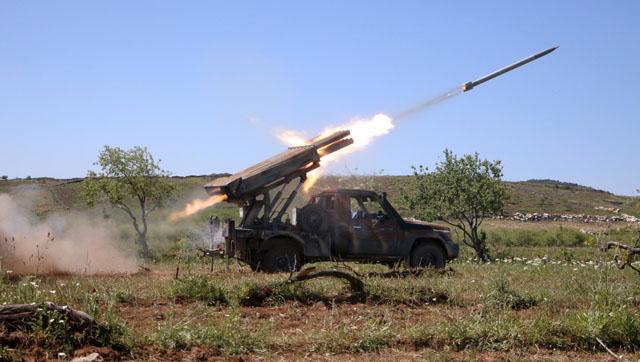You are here
Deserted streets in Syria’s Idlib after rebel capture
By AFP - Apr 04,2015 - Last updated at Apr 04,2015
IDLIB, Syria — The streets of the Syrian city of Idlib are still virtually deserted a week after its capture from government forces by Islamist rebels including fighters from Al Qaeda affiliate Al Nusra Front.
All around, the carcasses of cars and rubble of crumpled buildings bear witness to the ferocity of the fighting for the northwestern city, which is only the second provincial capital to be lost by the government in more than four years of civil war.
A handful of grocers and vegetable stalls have reopened for business but many of their customers have fled, terrified by the fighting and the retaliatory air strikes that followed the city's fall on March 28.
"I'm hardly selling anything, mostly because everyone has fled town because of the brutal fighter jet bombings," said Saad Muarawi, a spice vendor.
Muarawi says he has had no difficulty in getting the goods to sell despite the city changing hands.
"I have the products," he says, adding that now they come from other rebel-held parts of northern Syria.
"Before, the regime forced us to get our supplies from the coastal areas, or Hama. But now, thank God, the road is open."
Many of the shops around Muarawi's show damage from the fighting. Some are gutted, others have their facades blown in.
Outside, only a few people venture out, some on bicycles, other on foot.
Before the uprising erupted in March 2011, Idlib had a population of around 200,000, which was swelled in subsequent years by thousands seeking refuge from fighting in the surrounding countryside.
But many of those fled as the rebels advanced, and most of the more than 130 people killed in the battle for the city were combatants.
Only a few residents have so far returned.
"There are those who are afraid to go back because of air strikes and the fear of an eventual regime bid to retake the city," said the head of the Syrian Observatory for Human Rights, Rami Abdel Rahman.
"Then there are others who didn't want to stay under Al Nusra and its Islamist allies and have left for Latakia," a neighbouring province on the Mediterranean coast that is mostly under government control.
It is still unclear who controls Idlib's new administration.
While the Western-backed opposition National Coalition welcomed the city's capture, others have expressed fear that Al Nusra will impose its harsh interpretation of Islam.
The Britain-based Observatory reported this week that several alcohol shops and a large quantity of tobacco were set alight after the rebel takeover.
Above the city's clock tower and several government buildings flies the black flag of Al Nusra, with the name of its powerful Islamist ally Ahrar Al Sham graffitied on a number of shop fronts.
But for the moment, no concrete measures have been taken to set up a new administration for the city, where there is still no electricity although the water supply has been restored.
"We will get services going again for citizens, like the bakeries and the electricity, and we'll work with other groups so that normal life can resume in the city," Al Nusra member Abu Abdel Wahab told AFP.
"A mixed commission [of Al Nusra and other groups] will be formed," he added.
Last year, Al Nusra chief Abu Mohamed Al Jolani called for the establishment of an Islamic "emirate" that analysts said was intended to rival the "caliphate" established by Al Qaeda's jihadist competitors, the Daesh group.
But in an audio recording released on Wednesday, Jolani insisted that Al Nusra would not "monopolise" power in Idlib.
And on the ground, fighters say they hope the city will provide a base for further advances against the regime.
Government forces retain only a few strongholds in the surrounding province.
"It's from Idlib that we will go on to liberate the rest of Syria's provinces," Abdel Wahab said.
Related Articles
Al Qaeda's Syrian affiliate and its allies seized on Saturday the city of Idlib, only the second provincial capital to be lost by the regime in more than four years of war.
Al Qaeda's Syrian affiliate and its allies seized the last major government-held city in Idlib province on Saturday, in a blow that could expose the regime's coastal heartland to rebel attack.
Syrian rebels launched an offensive Tuesday against a major government-held city in northwestern Syria, shelling the outskirts and warning residents to remain indoors in the coming days.
















